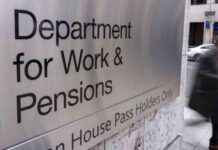A Shocking Revelation: State Pensioners Face Imminent Tax Increase
In a recent survey, it has been revealed that up to ten million pensioners could be facing income tax payments by the year 2032. This startling prediction has sent shockwaves through the retirement community, with three quarters of retirees expected to be pulled into the tax net under the current policies of the Labour Party government.
Former Liberal Democrats pensions minister, Sir Steve Webb, brought these alarming statistics to light in an interview with the Telegraph newspaper. According to Webb, this trend is the result of a perfect storm created by frozen income tax thresholds, an aging population, and the increasing value of the state pension due to the triple lock mechanism.
“The proportion of pensioners being taxed has seen a sharp increase in recent years, as significant pension increases have clashed with stagnant tax thresholds,” explained Webb. “While future pension rises may be more modest, the continued freeze on thresholds could mean more and more pensioners will find themselves in the tax bracket.”
The looming crisis has drawn criticism from various quarters, with John O’Connell of the TaxPayers’ Alliance calling the policy “disastrous” and urging for a change. O’Connell highlighted the widespread impact of frozen thresholds, noting that pensioners are feeling the squeeze as their savings are eroded by the tax burden.
Rachel Reeves, the current Shadow Chancellor of the Exchequer, has been called upon to address this pressing issue. O’Connell believes that unfreezing the thresholds could provide relief to households and stimulate economic growth. The need for action is urgent, as the number of pensioners is projected to increase by nearly 2 million by the early 2030s.
Morgan Vine, representing Independent Age, emphasized the human impact of these financial challenges. “Approximately 2 million older adults in the UK are currently living in poverty, with an additional 1 million teetering on the edge,” Vine stated. “For many, this reality translates to sacrifices like washing in cold water, skipping meals, and huddling in a single room to save on heating costs. It’s a grim existence that no one should have to endure.”
Vine stressed the importance of bipartisan cooperation to establish a minimum income that can shield older individuals from financial hardship in their later years. This, Vine believes, is crucial for the well-being of both current and future generations of retirees.
As the debate over pension taxation continues to heat up, it is clear that decisive action is needed to protect the financial security of the elderly population. The implications of these policies go beyond mere numbers and statistics – they have a real, tangible impact on the lives of individuals who have worked hard and contributed to society throughout their careers. It is a call to action for policymakers to come together and create solutions that prioritize the well-being of our senior citizens.



























